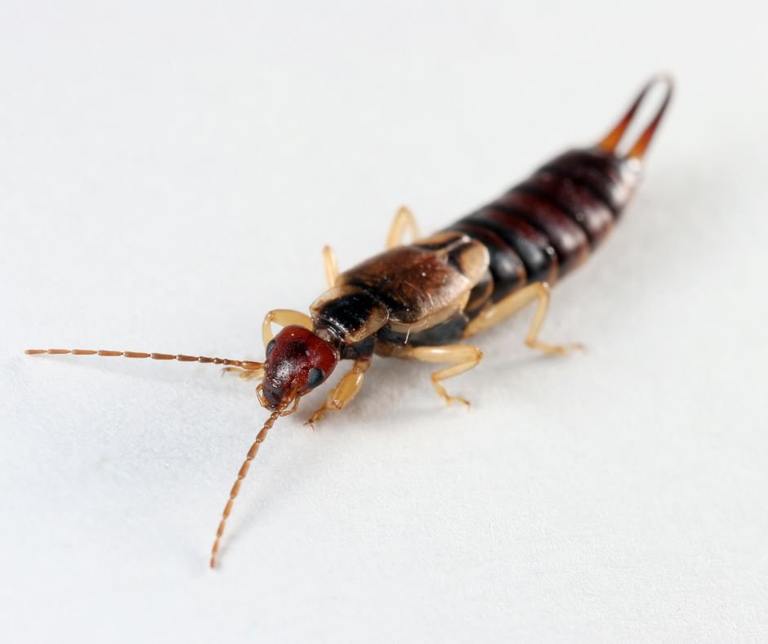Earwigs in Florida? What to do Next!
Published: February 14, 2024

Earwigs, also known as pincher bugs or earwings, are small insects that belong to the order Dermaptera. They are characterized by their elongated bodies and pincer-like appendages at the end of their abdomen. Despite their intimidating appearance, earwigs are generally harmless to humans. In this article, we will explore some common questions about earwigs in Florida and discuss what you can do if you find them in your house.

What are Earwigs?
Earwigs are nocturnal insects that prefer dark and damp environments. They are commonly found in gardens, under rocks or logs, and inside decaying plant matter. The name "earwig" is derived from a myth that these insects crawl into people's ears and feed on their brain while they sleep, which is not true. Earwigs primarily feed on other insects, plants, fungi and organic matter. There are a few common types of earwigs found in Florida including the Forficulidae, and the Euborellia Annulipes. Regardless of whichever species you may have, the main characteristic of these insects are their large intimidating pincers.
Do Earwigs Sting?
One of the most common concerns people have about earwigs is whether they sting. While earwigs do possess pincers at the end of their abdomen, they are not venomous and rarely use them for defense. In rare cases, an earwig might pinch if it feels threatened or cornered, but their pinch is generally harmless to humans. Its important to note that earwigs don't carry diseases like mosquitoes or fleas do.
Where do Earwigs Come From?
Earwigs are found worldwide, with different species inhabiting various regions. In Florida, the most common species is the European earwig (Forficula auricularia). These insects thrive in warm and humid climates like Florida's subtropical environment. They reproduce rapidly and can become a nuisance when their population increases. Most of the time they live in the yard or the mulch beds around the home, however once their populations rise and there is a sudden change in weather, it can drive these nuisance pests into your home.
How do Earwigs Get in My House?
Earwigs enter houses seeking shelter, moisture, or food sources. They can gain access through small cracks or openings around windows, doors, utility lines, or damaged screens. Additionally, earwigs may inadvertently hitch a ride on items brought indoors from the garden or other infested areas. Once inside, like most common household pests they tend to hide in dark and damp areas such as basements, bathrooms, and kitchens.
What Can I Do About Earwigs in Florida?
If you discover earwigs in your house, here are several basic tips to manage Earwigs in Florida:
- Identify and Seal Entry Points: Inspect your home for any cracks or openings that might serve as entry points for earwigs. Seal these gaps using caulk or weatherstripping to prevent further infestation. This can include gaps under doors or sliders, cracks in foundation walls or the homes concrete slab
- Reduce Moisture: Earwigs are attracted to moisture-rich environments. Ensure that your home is well-ventilated and fix any plumbing leaks or water accumulation issues promptly.
- Remove Attractants: Clear away debris, dead leaves, and decaying organic matter from around your home's foundation. Trim vegetation near the house to reduce potential hiding spots for earwigs.
- Use Natural Repellents: Certain natural repellents like diatomaceous earth, cedar oil, or citrus-based sprays can help deter earwigs from entering your home. Apply these repellents around entry points or areas where you have seen earwig activity.
- Professional Pest Control: If the infestation persists despite your efforts, consider contacting a professional pest control service like All U Need Pest Control. They can assess the situation and provide targeted treatments if necessary. We also handle all of your home pest issues including ants, roaches, silverfish, spiders, fleas, ticks, etc. Call us today to discuss treatment options to rid your home and yard of these insects at 1-888-239-8742.
Conclusion
While finding earwigs in your Florida home might be unsettling, it's important to remember that they are generally harmless insects. By understanding their behavior and implementing preventive measures like sealing entry points and reducing moisture levels, you can effectively manage an earwig infestation. If the problem persists, seeking professional assistance can provide further guidance and targeted solutions. Stay vigilant, and don't let earwigs dampen your enjoyment of your home!